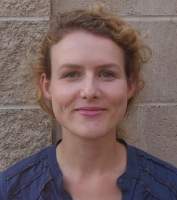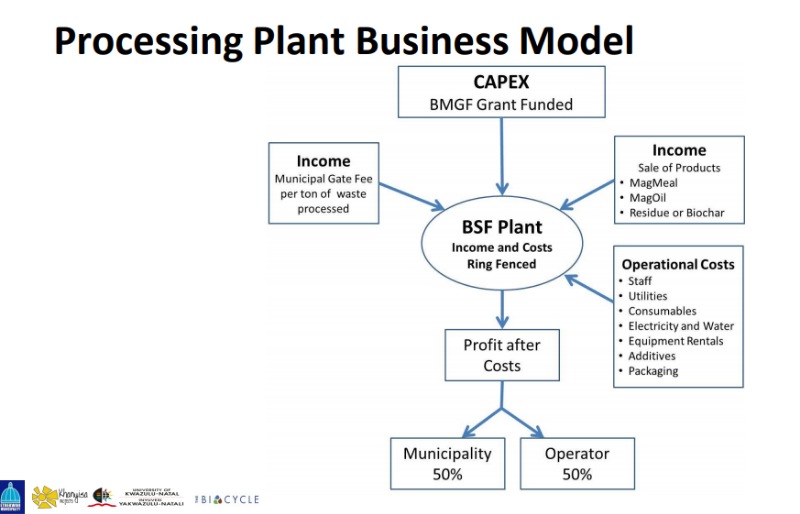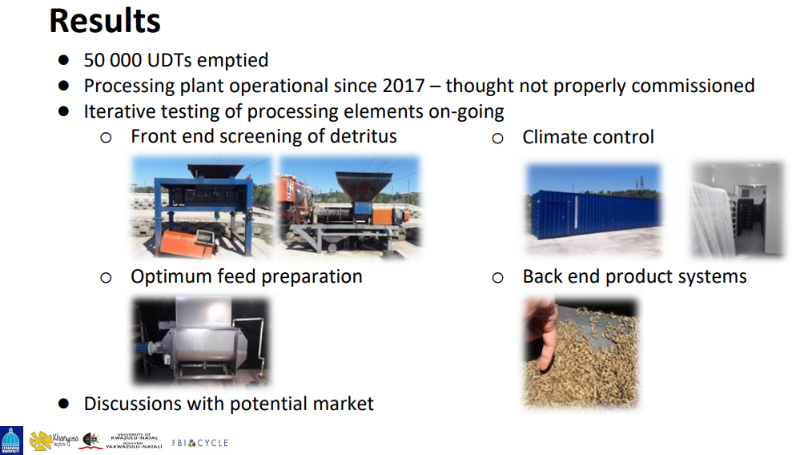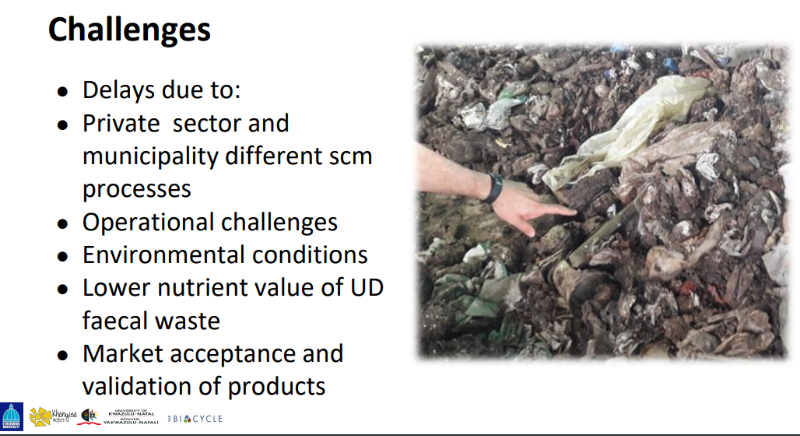- Resource recovery
- Production of insect biomass from excreta or organic waste
- Urine diversion toilet waste removal and re-use through black soldier fly (BSF) technology (Khanyisa Projects and eThekwini Municipality, South Africa)
Urine diversion toilet waste removal and re-use through black soldier fly (BSF) technology (Khanyisa Projects and eThekwini Municipality, South Africa)
14.2k views
- Elisabeth
-
- User is blocked
- Freelance consultant since 2012
Less- Posts: 3372
- Karma: 54
- Likes received: 932
Re: Urine diversion toilet waste removal and re-use through black soldier fly (BSF) technology (Khanyisa Projects and eThekwini Municipality, South Africa)
An update about this project is now available in this presentation given at the
FSM5 Conference
in Feb 2019:
"Complexities around PPPs within the Circular Economy in Durban South Africa" by Teddy Gounden, Nick Alcock, Sue Mercer, Marc Lewis, Dave Wilson
fsm5.susana.org/images/FSM_Conference_Ma...19---19-Feb-2019.pdf
The decision was made in 2017 to build a Black Soldier Fly (BSF) Facility to recover nutrients from UD waste (from 50,000 UDDTs in the Durban area)
Lots of interesting information in there detailing the challenges which led to delays in the project and the lessons learnt. I picked out these three slides for you:
Regards,
Elisabeth
"Complexities around PPPs within the Circular Economy in Durban South Africa" by Teddy Gounden, Nick Alcock, Sue Mercer, Marc Lewis, Dave Wilson
fsm5.susana.org/images/FSM_Conference_Ma...19---19-Feb-2019.pdf
The decision was made in 2017 to build a Black Soldier Fly (BSF) Facility to recover nutrients from UD waste (from 50,000 UDDTs in the Durban area)
Lots of interesting information in there detailing the challenges which led to delays in the project and the lessons learnt. I picked out these three slides for you:
Regards,
Elisabeth
Dr. Elisabeth von Muench
Freelance consultant on environmental and climate projects
Freelance consultant on environmental and climate projects
Please Log in to join the conversation.
You need to login to replyRe: Urine diversion toilet waste removal and re-use through black soldier fly (BSF) technology (Khanyisa Projects and eThekwini Municipality, South Africa)
Hi Sarah
Sorry for the delayed response.
I would agree that the removal system remains relevant whatever the processing strategy is.
By being "cost effective" we would mean at a lower cost than other options such as disposal to hazardous waste sites, composting or even burial. We are not sure how cost effective it will be as yet as much depends on the success of the BSF process and the value that is derived from the products. Unfortunately the tender for the removal process has not been awarded by the Municipality as yet. We are trying to resolve this “blockage”
We will evaluate the risks to the environment as a whole and how the project is able to reduce those risks. Please see attached planning document for health and environmental compliance.
Unfortunately the delays to the removal tender mean that I cannot give you a more extensive response at this stage but I hope we can comment soon with real progress and real lessons learned.
Regards
Nick
Sorry for the delayed response.
I would agree that the removal system remains relevant whatever the processing strategy is.
By being "cost effective" we would mean at a lower cost than other options such as disposal to hazardous waste sites, composting or even burial. We are not sure how cost effective it will be as yet as much depends on the success of the BSF process and the value that is derived from the products. Unfortunately the tender for the removal process has not been awarded by the Municipality as yet. We are trying to resolve this “blockage”
We will evaluate the risks to the environment as a whole and how the project is able to reduce those risks. Please see attached planning document for health and environmental compliance.
Unfortunately the delays to the removal tender mean that I cannot give you a more extensive response at this stage but I hope we can comment soon with real progress and real lessons learned.
Regards
Nick
This message has an attachment file.
Please log in or register to see it.
The following user(s) like this post: SDickin
Please Log in to join the conversation.
You need to login to reply- SDickin
-

- User is blocked
- I'm a research fellow at the Stockholm Environment Institute and a geographer interested in environment health linkages, including how water and sanitation fit within the greater sustainable development agenda.
Less- Posts: 68
- Karma: 4
- Likes received: 26
Re: Urine diversion toilet waste removal and re-use through black soldier fly (BSF) technology (Khanyisa Projects and eThekwini Municipality, South Africa)
hi Nick,
I was wondering if you have any updates about Objective 1? It seems that any lessons learned in developing 'implementation of a cost effective faecal waste removal system for the estimated 80 000 households in rural areas surrounding' could be relevant to other work, even if using BSF is not involved. Would cost effective mean you cover costs, or that the costs are acceptable for the municipality to pay?
While the end goal is improving health of residents, are you looking at or evaluating any in-direct benefits to health and wellbeing that come from reducing environmental risks with this project?
thanks in advance,
Sarah
I was wondering if you have any updates about Objective 1? It seems that any lessons learned in developing 'implementation of a cost effective faecal waste removal system for the estimated 80 000 households in rural areas surrounding' could be relevant to other work, even if using BSF is not involved. Would cost effective mean you cover costs, or that the costs are acceptable for the municipality to pay?
While the end goal is improving health of residents, are you looking at or evaluating any in-direct benefits to health and wellbeing that come from reducing environmental risks with this project?
thanks in advance,
Sarah
Dr. Sarah Dickin,
Research Fellow
Stockholm Environment Institute
Stockholm, Sweden
This email address is being protected from spambots. You need JavaScript enabled to view it.
Research Fellow
Stockholm Environment Institute
Stockholm, Sweden
This email address is being protected from spambots. You need JavaScript enabled to view it.
Please Log in to join the conversation.
You need to login to replyRe: Urine diversion toilet waste removal and re-use through black soldier fly (BSF) technology (Khanyisa Projects and eThekwini Municipality, South Africa)
Hi Milli
Please find below, answers to your questions. Hope this is of help to you.
Regards
Nick
++++++++
Does pilot plants exist where the bioconversion from faeces to soil residue takes place?
Biocycle had a pilot plant near Stellenbosch in South Africa where they ran trials to prove the concept.
What time period does it take to convert a certain amount of faeces?
When added to food waste it will take approximately 10 to 12 days.
Is the soil residue completely free of pathogens?
No, so soil residue must be used with caution. Biocycle are also looking to convert residue to Biochar which would eliminate the remaining pathogens.
What is the advantage compared to conventional composting respectively biogas fermentation (since it comprises a certain effort to breed the larvaes and so on)?
If we are able to convert the wastes into oils, feed, and soil fertility, then the benefits far outweigh conventional composting processes.
Do larvae contain such a high amount of oil that it is really possible to extract oil out of them?
Yes, between 30 and 50% of their mass.
How about the selling market, is there a demand for products like livestock feed or industrial oil out of larvae?
There is a dearth of fertility globally, as well as protein. If we are able to prove the safety of protein sourced from maggots that have fed on faeces then any additional protein supply will be welcomed.
You mention the challenge of risks related to the operation of BSF plant for processing faecal waste. What are the main risks?
Production rates linked to faecal waste make up and market reaction to the products.
What is done with the urine from the toilets?
At this stage it runs into soak aways at the onsite toilets but research is being undertaken at UKZN into viable reuse options ( Please contact Chris Buckley ( This email address is being protected from spambots. You need JavaScript enabled to view it.) at the University of KwaZulu Natal in this regard.
Please find below, answers to your questions. Hope this is of help to you.
Regards
Nick
++++++++
Does pilot plants exist where the bioconversion from faeces to soil residue takes place?
Biocycle had a pilot plant near Stellenbosch in South Africa where they ran trials to prove the concept.
What time period does it take to convert a certain amount of faeces?
When added to food waste it will take approximately 10 to 12 days.
Is the soil residue completely free of pathogens?
No, so soil residue must be used with caution. Biocycle are also looking to convert residue to Biochar which would eliminate the remaining pathogens.
What is the advantage compared to conventional composting respectively biogas fermentation (since it comprises a certain effort to breed the larvaes and so on)?
If we are able to convert the wastes into oils, feed, and soil fertility, then the benefits far outweigh conventional composting processes.
Do larvae contain such a high amount of oil that it is really possible to extract oil out of them?
Yes, between 30 and 50% of their mass.
How about the selling market, is there a demand for products like livestock feed or industrial oil out of larvae?
There is a dearth of fertility globally, as well as protein. If we are able to prove the safety of protein sourced from maggots that have fed on faeces then any additional protein supply will be welcomed.
You mention the challenge of risks related to the operation of BSF plant for processing faecal waste. What are the main risks?
Production rates linked to faecal waste make up and market reaction to the products.
What is done with the urine from the toilets?
At this stage it runs into soak aways at the onsite toilets but research is being undertaken at UKZN into viable reuse options ( Please contact Chris Buckley ( This email address is being protected from spambots. You need JavaScript enabled to view it.) at the University of KwaZulu Natal in this regard.
The following user(s) like this post: milli
Please Log in to join the conversation.
You need to login to reply- milli
-

- I am working in the field of environmental and sustainability issues, professionally and privately. Waste and wastewater are some of my main topics.
Less- Posts: 30
- Karma: 2
- Likes received: 6
Re: Urine diversion toilet waste removal and re-use through black soldier fly (BSF) technology (Khanyisa Projects and eThekwini Municipality, South Africa)
Dear Nick,
your project seems pretty interesting to me. I like the idea of closing cycles, and using larvae from black soldier fly is a completly new topic to me. That’s why I want to ask some question in hope that they have not been addressed before.
I am curious about your answers. Thank you.
best regards,
milli
your project seems pretty interesting to me. I like the idea of closing cycles, and using larvae from black soldier fly is a completly new topic to me. That’s why I want to ask some question in hope that they have not been addressed before.
- Do pilot plants exist where the bioconversion from faeces to soil residue takes place? What time period does it take to convert a certain amount of faeces? Is the soil residue completely free of pathogens? What is the advantage compared to conventional composting respectively biogas fermentation (since it comprises a certain effort to breed the larvae and so on)?
- Do larvae contain such a high amount of oil that it is really possible to extract oil out of them?
- How about the market, is there a demand for products like livestock feed or industrial oil out of larvae?
- You mention the challenge of risks related to the operation of BSF plant for processing faecal waste. What are the main risks?
- What is done with the urine from the toilets?
I am curious about your answers. Thank you.
best regards,
milli
Danijela Milosevic
M.Sc. Environmental and Resource Management
Gießen, Germany
M.Sc. Environmental and Resource Management
Gießen, Germany
Please Log in to join the conversation.
You need to login to replyUrine diversion toilet waste removal and re-use through black soldier fly (BSF) technology (Khanyisa Projects and eThekwini Municipality, South Africa)
Here is the description of a project that I am leading and which I also presented at the recent FSM3 conference in Hanoi. It deals with urine-diverting dry toilets (UDDTs) in the eThekwini Municipality and black soldier fly technology.
This post could have also gone in the category on business opportunities in sanitation, or in the category on UDDTs, but as it also deals with resource recovery and technical aspects, we have decided to put it here.
Title of grant:
Urine Diversion Toilet Waste Removal and Re-Use through
Black Soldier Fly (BSF) Technology
Subtitle: Providing a safe and cost effective faecal waste removal service to the estimated 85 000 low income rural homesteads making use of Urine Diversion Toilets within the eThekwini Municipality in order to improve health and ultimately quality of life.
Name of lead organization: Khanyisa Projects (www.khanyisapr.co.za )
Primary contact at lead organization: Nick Alcock
Grantee location: Durban (eThekwini Municipality) South Africa
Developing country where the research is being tested: South Africa
Start and end date: 13 November 2014 to 30 November 2017
Grant type: City Partnerships for Urban Sanitation (co-funded by DFID)
Grant size in USD: $1 304 155 (as per BMGF grant database here )
Short description of the project:
Since 2002, eThekwini Municipality (Durban, South Africa) has installed over 80 000 Urine Diversion (UD) double vault toilets (abbreviation of UDs used in the Municipality) at the household level in rural areas. This technology was selected to replace Ventilated Improved Pit Latrines (VIPs) as the Municipality’s basic onsite sanitation option as it was expected that the UD systems would produce a degraded sludge which could be safely removed and buried on site by the resident. This approach eliminated the challenges and costs encountered when servicing VIP systems, which included access to pits, removal of sludge containing solid waste, and transport and disposal of sludge.
However, a number of concerns have since arisen over the removal of faecal material from UD toilets. These include health risks to residents who handle the potentially pathogenic sludge and dissatisfaction amongst household owners over the expectation that they will remove the faecal matter from their systems themselves while other recipients of basic sanitation receive a free service from the Municipality. The Municipality therefore needs to identify other safe and economically feasible faecal matter removal options which can be provided to the 80 000 (and increasing) homes.
Key challenges are summarized as follows:
• Health and environmental risks and regulations during the removal and transport of a regulated hazardous waste.
• The costs associated with transport of waste (excreta) from remote areas to a decentralized processing plant
• Selecting suitable waste treatment processes
• Finding a cost effective and viable business model for processing the waste
• Meeting the expectations of communities and local politicians
• Finding appropriate financial incentives for maximizing - the efficiency of the private sector involvement
• Sustainability of local business entities in the sanitation sector
Though funding from the Bill & Melinda Gates Foundation (BMGF), the eThekwini Municipality’s Water and Sanitation Unit (EWS), together with a professional consulting team (Khanyisa Projects, Partners and Development and the University of KwaZulu-Natal’s Pollution Research Group) is exploring the use of business partnerships using incentivized contracts for the safe and efficient removal and disposal or processing of the UD contents.
Goal(s):
Test the use of Public Private Partnerships to ultimately improve the delivery of sanitation service to low income households through an incentivized emptying and transport contract and an operating contract for processing of waste (excreta) to develop valuable products.
Objectives:
My presentation at the recent FSM3 Conference in Hanoi is available in the SuSanA library (future documents from this project will also be placed here): www.susana.org/en/resources/library/details/2173
Urine Diversion Toilet Waste Removal in eThekwini Municipality - Business Partnership Modeling: Nick Alcock, Khanyisa projects, Aqualima Trust, Durban, South Africa
Other projects and case studies that are linked to this study include:
Roma, E., Holzwarth, S., Buckley, C. (2011). Large-scale peri-urban and rural sanitation with UDDTs, eThekwini Municipality (Durban), South Africa – Case study of sustainable sanitation projects. Sustainable Sanitation Alliance (SuSanA)
www.susana.org/en/resources/case-studies/details/791
Economic Evaluation of Faecal Sludge Disposal Routes (BMGF contract # 22834) - no document available
A previous discussion thread in this forum about BSF research in South Africa is available here .
Current state of affairs:
• Finalization of the Service Level Agreement between the Municipality and the BSF plant operator. Agriprotein, a for profit company in the feedstock arena has been undertaking research into sanitation solutions using BSF; it has established a for profit company called Biocycle to operate the plant using the experience and technology developed through Agriprotein
• Design and development of tender documents for the BSF plant
• Establishment of the tender document for the UD waste* removal contract
• Success in obtaining various Municipal and National Government approvals. The Municipality has various decision making bodies such as the Executive Committee (Exco) which must approve the project and the appointment of a service provider without the use of the normal tender process. Legislation requires that National Treasury must give permission for the project to be undertaken over a period longer than three years.
Biggest successes so far:
o Appointment of project manager by eThekwini Municipality
o Draft service level agreement between the Municipality and the BSF plant operator approved by the municipal legal department
Main challenges / frustration:
o Risks related to the operation of BSF plant for processing faecal waste at scale
o The approval process at the Municipality and National Treasury requires interaction with a number of different bodies and personnel. These interventions or steps can delay the project
o Development of an acceptable testing protocol for BSF products which will include mature larvae and soil residue. Further processing of larvae may take place to produce oils, livestock and pet food as well as biochar from the residue.
o Lack of GIS data to enable exact location of UD toilets
o Lack of knowledge over which UD toilets are in use and which are not (this impacts on UD waste removal contracts). It is estimated that 20% are not in use due to a number of factors including:
Any questions?
Regards,
Nick
Nick Alkock
www.khanyisapr.co.za
Durban, South Africa
* If people throw solid waste into the UDDTs, this solid will in principle also be removed as well without any fines to the home owners (that is the plan for now).
This post could have also gone in the category on business opportunities in sanitation, or in the category on UDDTs, but as it also deals with resource recovery and technical aspects, we have decided to put it here.
Title of grant:
Urine Diversion Toilet Waste Removal and Re-Use through
Black Soldier Fly (BSF) Technology
Subtitle: Providing a safe and cost effective faecal waste removal service to the estimated 85 000 low income rural homesteads making use of Urine Diversion Toilets within the eThekwini Municipality in order to improve health and ultimately quality of life.
Name of lead organization: Khanyisa Projects (www.khanyisapr.co.za )
Primary contact at lead organization: Nick Alcock
Grantee location: Durban (eThekwini Municipality) South Africa
Developing country where the research is being tested: South Africa
Start and end date: 13 November 2014 to 30 November 2017
Grant type: City Partnerships for Urban Sanitation (co-funded by DFID)
Grant size in USD: $1 304 155 (as per BMGF grant database here )
Short description of the project:
Since 2002, eThekwini Municipality (Durban, South Africa) has installed over 80 000 Urine Diversion (UD) double vault toilets (abbreviation of UDs used in the Municipality) at the household level in rural areas. This technology was selected to replace Ventilated Improved Pit Latrines (VIPs) as the Municipality’s basic onsite sanitation option as it was expected that the UD systems would produce a degraded sludge which could be safely removed and buried on site by the resident. This approach eliminated the challenges and costs encountered when servicing VIP systems, which included access to pits, removal of sludge containing solid waste, and transport and disposal of sludge.
However, a number of concerns have since arisen over the removal of faecal material from UD toilets. These include health risks to residents who handle the potentially pathogenic sludge and dissatisfaction amongst household owners over the expectation that they will remove the faecal matter from their systems themselves while other recipients of basic sanitation receive a free service from the Municipality. The Municipality therefore needs to identify other safe and economically feasible faecal matter removal options which can be provided to the 80 000 (and increasing) homes.
Key challenges are summarized as follows:
• Health and environmental risks and regulations during the removal and transport of a regulated hazardous waste.
• The costs associated with transport of waste (excreta) from remote areas to a decentralized processing plant
• Selecting suitable waste treatment processes
• Finding a cost effective and viable business model for processing the waste
• Meeting the expectations of communities and local politicians
• Finding appropriate financial incentives for maximizing - the efficiency of the private sector involvement
• Sustainability of local business entities in the sanitation sector
Though funding from the Bill & Melinda Gates Foundation (BMGF), the eThekwini Municipality’s Water and Sanitation Unit (EWS), together with a professional consulting team (Khanyisa Projects, Partners and Development and the University of KwaZulu-Natal’s Pollution Research Group) is exploring the use of business partnerships using incentivized contracts for the safe and efficient removal and disposal or processing of the UD contents.
Goal(s):
Test the use of Public Private Partnerships to ultimately improve the delivery of sanitation service to low income households through an incentivized emptying and transport contract and an operating contract for processing of waste (excreta) to develop valuable products.
Objectives:
- Objective 1: Implementation of a cost effective faecal waste removal system for the estimated 80 000 households in rural areas surrounding the city in order to ultimately improve health and safety of the residents. In meeting this objective, success will be removal of all faecal matter from the UD toilets and the empowering of a number of local teams under the managing contract to undertake the work independently and sustainably in the second cycle beginning in year three of operations.
- Objective 2: Development and operation of a cost effective faecal waste processing plant using Black Soldier Fly (BSF) Technology through a partnership (using an operating contract) with a private sector organization. Success in meeting this objective will be the reduction in costs of processing or disposal of faecal waste through the sale of value added products by the BSF business partner.
- eThekwini Water and Sanitation Services (EWS)
- University of KwaZulu Natal Pollution Research Group (PRG)
- Partners in Development (PID)
My presentation at the recent FSM3 Conference in Hanoi is available in the SuSanA library (future documents from this project will also be placed here): www.susana.org/en/resources/library/details/2173
Urine Diversion Toilet Waste Removal in eThekwini Municipality - Business Partnership Modeling: Nick Alcock, Khanyisa projects, Aqualima Trust, Durban, South Africa
Other projects and case studies that are linked to this study include:
Roma, E., Holzwarth, S., Buckley, C. (2011). Large-scale peri-urban and rural sanitation with UDDTs, eThekwini Municipality (Durban), South Africa – Case study of sustainable sanitation projects. Sustainable Sanitation Alliance (SuSanA)
www.susana.org/en/resources/case-studies/details/791
Economic Evaluation of Faecal Sludge Disposal Routes (BMGF contract # 22834) - no document available
A previous discussion thread in this forum about BSF research in South Africa is available here .
Current state of affairs:
• Finalization of the Service Level Agreement between the Municipality and the BSF plant operator. Agriprotein, a for profit company in the feedstock arena has been undertaking research into sanitation solutions using BSF; it has established a for profit company called Biocycle to operate the plant using the experience and technology developed through Agriprotein
• Design and development of tender documents for the BSF plant
• Establishment of the tender document for the UD waste* removal contract
• Success in obtaining various Municipal and National Government approvals. The Municipality has various decision making bodies such as the Executive Committee (Exco) which must approve the project and the appointment of a service provider without the use of the normal tender process. Legislation requires that National Treasury must give permission for the project to be undertaken over a period longer than three years.
Biggest successes so far:
o Appointment of project manager by eThekwini Municipality
o Draft service level agreement between the Municipality and the BSF plant operator approved by the municipal legal department
Main challenges / frustration:
o Risks related to the operation of BSF plant for processing faecal waste at scale
o The approval process at the Municipality and National Treasury requires interaction with a number of different bodies and personnel. These interventions or steps can delay the project
o Development of an acceptable testing protocol for BSF products which will include mature larvae and soil residue. Further processing of larvae may take place to produce oils, livestock and pet food as well as biochar from the residue.
o Lack of GIS data to enable exact location of UD toilets
o Lack of knowledge over which UD toilets are in use and which are not (this impacts on UD waste removal contracts). It is estimated that 20% are not in use due to a number of factors including:
- Some households have installed flush toilets
- Some households prefer to use pit toilets
- Some households were provided with more than one UD which they do not need
- Some UDs are in a bad state of repair and households have resorted to constructing their own informal pit toilets
Any questions?
Regards,
Nick
Nick Alkock
www.khanyisapr.co.za
Durban, South Africa
* If people throw solid waste into the UDDTs, this solid will in principle also be removed as well without any fines to the home owners (that is the plan for now).
Attachments:
-
 photo2.jpg
(Filesize: 43KB)
photo2.jpg
(Filesize: 43KB)
-
 photo1.jpg
(Filesize: 51KB)
photo1.jpg
(Filesize: 51KB)
The following user(s) like this post: hajo, reynolds
Please Log in to join the conversation.
You need to login to reply
Share this thread:
- Resource recovery
- Production of insect biomass from excreta or organic waste
- Urine diversion toilet waste removal and re-use through black soldier fly (BSF) technology (Khanyisa Projects and eThekwini Municipality, South Africa)
Recently active users. Who else has been active?
Time to create page: 0.410 seconds










